2017年人教版中考专题《情态动词》复习课件(共21张PPT)
文档属性
| 名称 | 2017年人教版中考专题《情态动词》复习课件(共21张PPT) |

|
|
| 格式 | zip | ||
| 文件大小 | 159.0KB | ||
| 资源类型 | 教案 | ||
| 版本资源 | 人教新目标(Go for it)版 | ||
| 科目 | 英语 | ||
| 更新时间 | 2017-02-16 21:04:30 | ||
图片预览

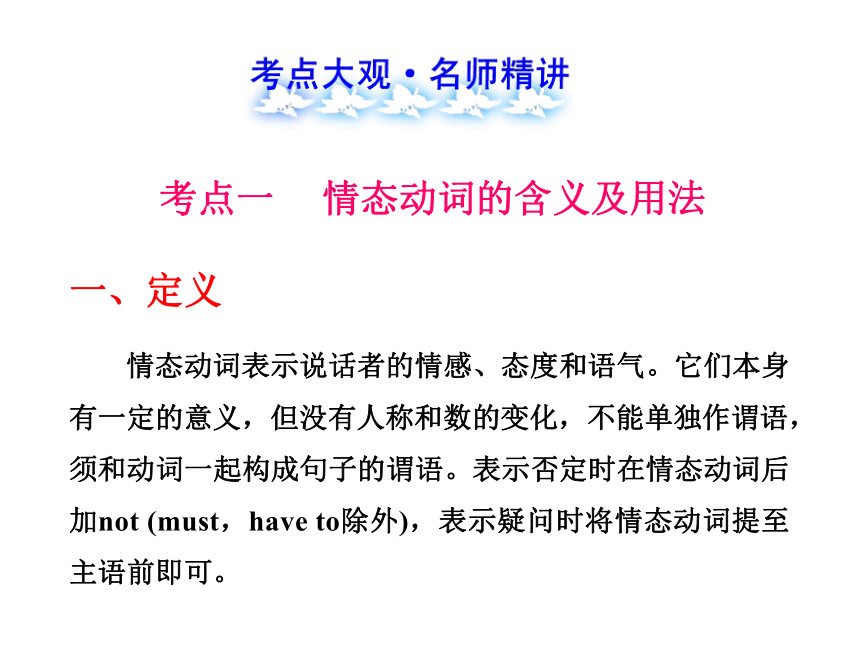
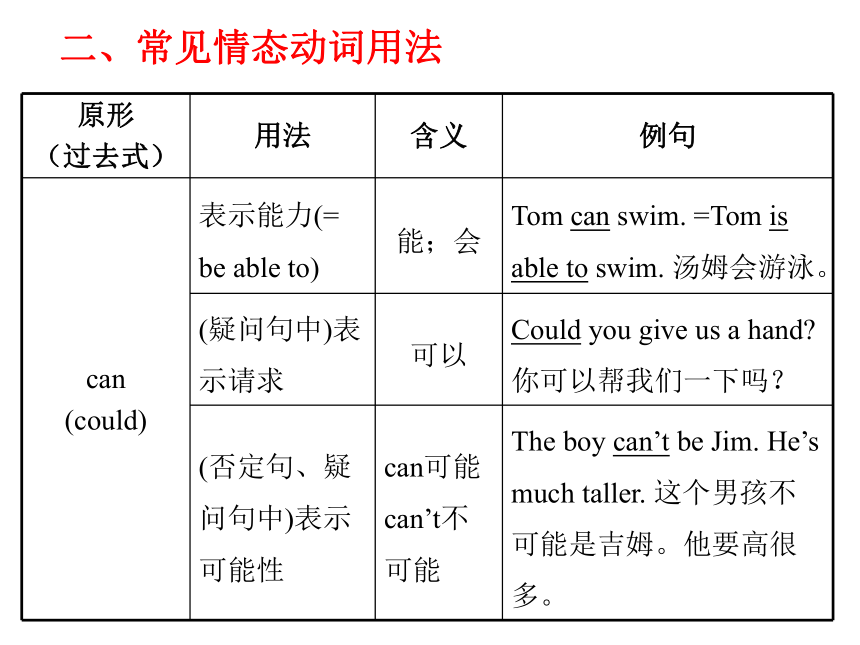
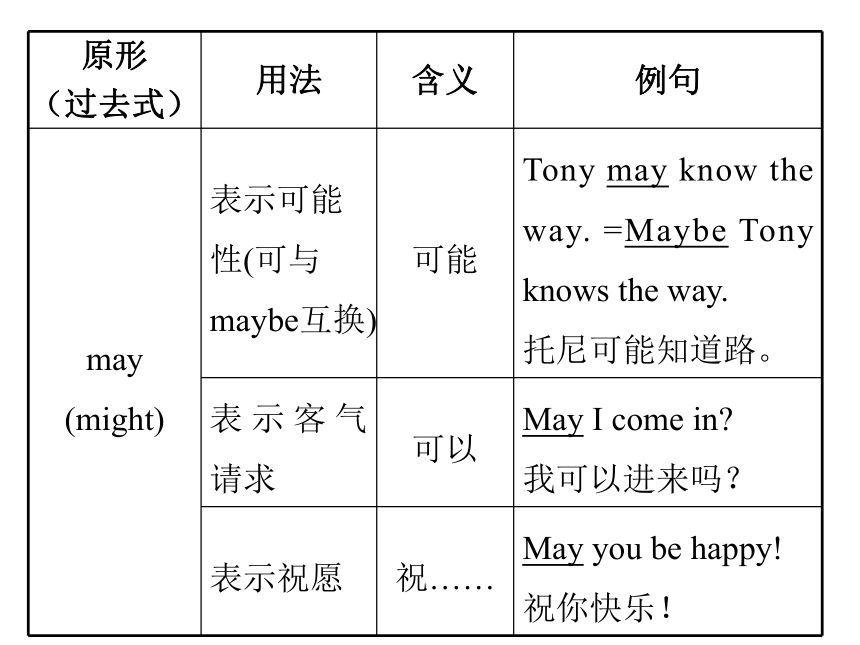
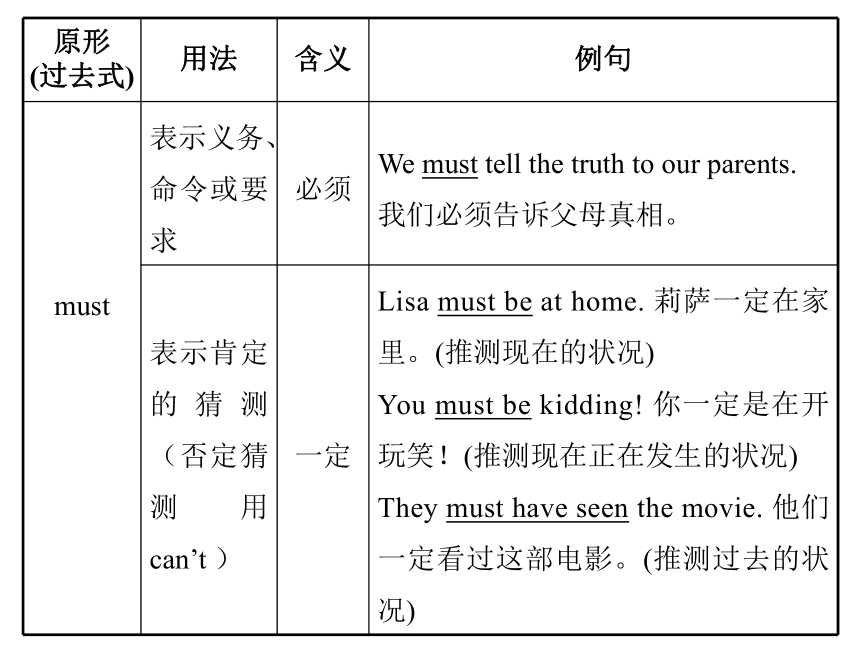
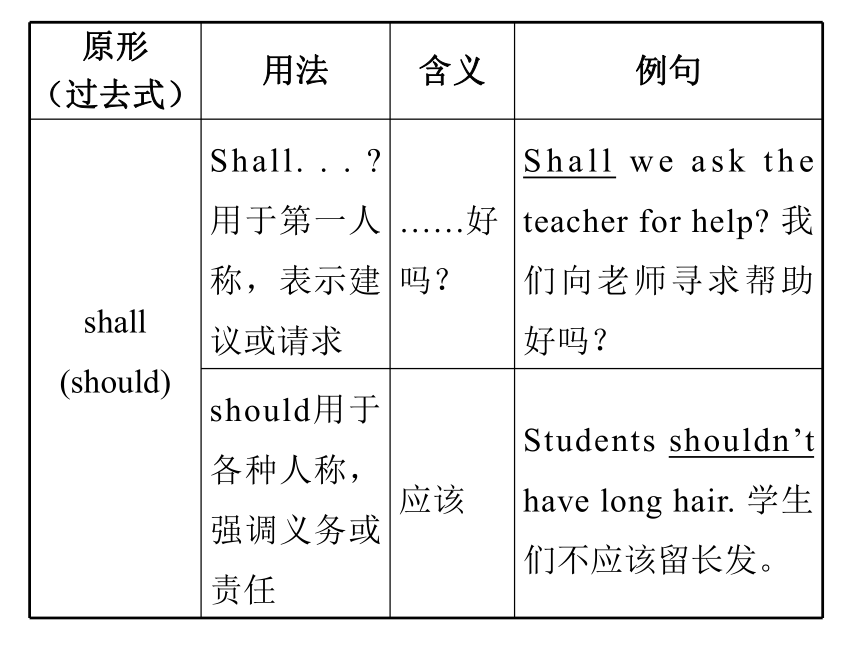
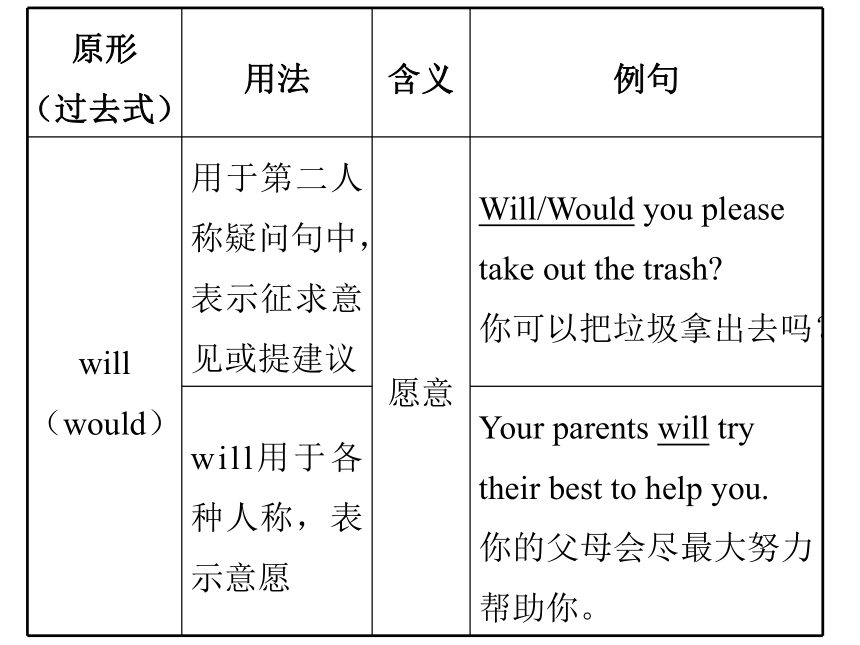
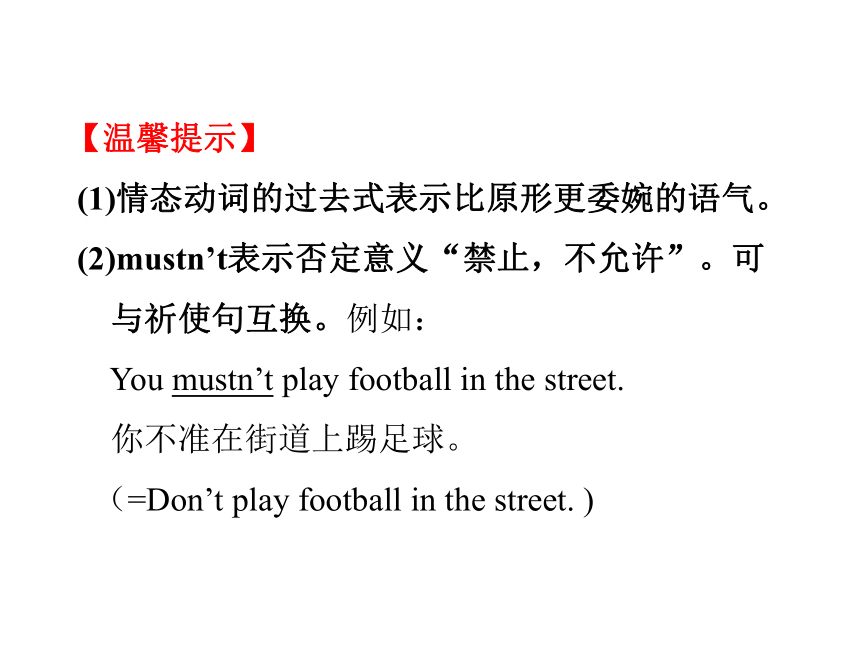
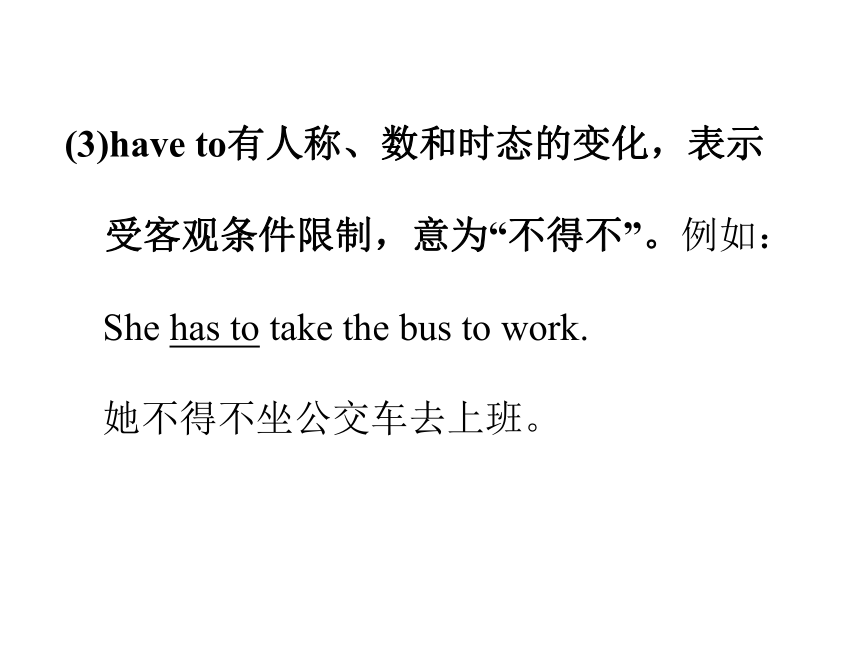
文档简介
课件21张PPT。情态动词 考点一 情态动词的含义及用法
一、定义
情态动词表示说话者的情感、态度和语气。它们本身有一定的意义,但没有人称和数的变化,不能单独作谓语,须和动词一起构成句子的谓语。表示否定时在情态动词后加not (must,have to除外),表示疑问时将情态动词提至主语前即可。二、常见情态动词用法 【温馨提示】
(1)情态动词的过去式表示比原形更委婉的语气。
(2)mustn’t表示否定意义“禁止,不允许”。可
与祈使句互换。例如:
You mustn’t play football in the street.
你不准在街道上踢足球。
(=Don’t play football in the street. )(3)have to有人称、数和时态的变化,表示
受客观条件限制,意为“不得不”。例如:
She has to take the bus to work.
她不得不坐公交车去上班。(4)May. . . ? 句式的否定回答:No, . . . mustn’t/can’t.
Must. . . ? 句式的否定回答:No, . . . needn’t/don’t have to.
①—May I smoke here? 我可以在这儿吸烟吗?
—No, you mustn’t. 不,你不可以。
②—Must I go now? 我必须现在走吗?
—No, you needn’t. 不,你没必要。
(5)must, should, may, might都可以表示推测,可能性程度由
大到小依次为:must﹥should﹥may﹥might。 考点二 易混情态动词
1. must & can’t
两者都表示推测,can’t意为“不可能”,must意为“一定”;句中一般会有说明推测理由的附属从句。例如:
―The girl in red must be Jenny. She often wears a red skirt to school. 那个穿红衣服的女孩一定是珍妮。她经常穿着红色的裙子去上学。
―No, it can’t be Jenny. I met her in the library just now and she was still reading newspapers there. 不,一定不是珍妮。刚才我在图书馆看见她了,她还在那儿看报纸呢。2. have to & must
(1)have to主要表示客观需要,意为“不得不”。有人称和时态的变化(has to; had to; will have to);
(2)must强调说话人的主观看法,意为“必须;应该”;
(3)否定形式的不同:mustn’t表示“禁止;不应该”;don’t have to表示“不必”,相当于needn’t。例如:
①The boy had to stay at home alone because his parents both went to work. 那个男孩不得不独自待在家里,因为他的父母都去上班了。
②We must go to school on time. 我们必须按时上学。
③You don’t have to (needn’t) lend me your car because young people mustn’t drive. 你不需要把你的车借给我,因为年轻人不能开车。3. can & be able to
(1)表示某种能力时,二者可通用;
(2)can只用于现在时和过去时(could), be able
to可用于各种时态;
(3)遇有助动词或情态动词时只能用be able to。
例如:
①Jack could (was able to) swim at the age of five.
杰克在五岁时就能游泳了。
②We’ll be able to fly to the moon soon.
我们很快就能飞往月球了。4. maybe & may be
maybe用于句首表示“可能;也许”,相当于perhaps;may be中的may是情态动词,后接动词原形be,表示“可能是”,在句中作谓语。两者可互换。例如:
Maybe the boy is from Canada. =The boy may be from Canada.
这个男孩可能来自加拿大。1. (2016 大连)We need clean air and water, so we _______ protect the environment.
A. can B. may C. must D.might
C【解析】句意为:我们需要清洁的空气和水,因此我们______保护环境。can能,能够;may可以,可能;must必须,一定;might可能。根据前半句可知此处指我们必须保护环境。故选 C。2. (2016 铜仁)—Is that boy Tom?
—It _______ be him. He has gone to his hometown to visit his grandparents.
A. can B. can’t C. must D. mustn’t
B【解析】句意为“那个男孩是汤姆吗?”“_____是他。他已经去家乡看望他的祖父母了。”can 可能,可以;can’t 不可能;must 必须;mustn’t 禁止。根据“他已经去家乡看望他的祖父母了”可知,不可能是汤姆。故选 B。3. (2016 威海改编)—Must I wait here all morning? I have a lot of work to do.
—No, you _____. You may be back in the afternoon.
A. mustn’t B. can’t C. don’t have to D.shouldn't
C【解析】句意“我必须在这儿等一早上吗?我有许多工作要做。”“不,你_______。你可以下午回来。”mustn’t 禁止;can’t 不可以;don’t have to 不必;shouldn't 不应该。以must提问的一般疑问句,其否定答语常用“No, you needn’t.”或“No, you don’t have to.”。故选 C。4. (2016 哈尔滨改编)—Hi, Jack! Could you come to our English party?
—Sorry, I ______. I have to look after my little sister at home.
A. must B. could C. can’t D. mustn't
C【解析】句意“你好,杰克!你会来我们的英语聚会吗?”“对不起,我______。我必须在家照顾我的妹妹。must 一定,必须;could 可以,能;can’t 不能;mustn't 禁止。由“必须在家照顾我的妹妹”可知表示不能去。故选 C。5. (2016 苏州)—What does Justin Bieber’s song Never Say Never impress you most?
—It tells us that we _______ do almost anything if we never give up.
A. can B. have to C. should D. need
A【解析】句意“贾斯汀比伯的歌《Never Say Never》使你印象最深的是什么?”“它告诉我们如果我们从不放弃,我们几乎_____做任何事。”can能够,表示个人的能力;have to不得不,should应该;need需要。根据句意,体现主语的能力。故选 A。6. (2016 安徽)Please don’t make so much noise. I _______ hear the speaker very well.
A. needn’t B. mustn’t C. can’t D.shouldn't
B【解析】句意为:请不要发出太大的噪音。我______很好地听见演讲者。needn’t 不必;mustn’t 不允许,禁止;can’t 不能;shouldn't 不应该。由句意可知,噪音太大,肯定不能够很好地听到演讲者。故选 B。
一、定义
情态动词表示说话者的情感、态度和语气。它们本身有一定的意义,但没有人称和数的变化,不能单独作谓语,须和动词一起构成句子的谓语。表示否定时在情态动词后加not (must,have to除外),表示疑问时将情态动词提至主语前即可。二、常见情态动词用法 【温馨提示】
(1)情态动词的过去式表示比原形更委婉的语气。
(2)mustn’t表示否定意义“禁止,不允许”。可
与祈使句互换。例如:
You mustn’t play football in the street.
你不准在街道上踢足球。
(=Don’t play football in the street. )(3)have to有人称、数和时态的变化,表示
受客观条件限制,意为“不得不”。例如:
She has to take the bus to work.
她不得不坐公交车去上班。(4)May. . . ? 句式的否定回答:No, . . . mustn’t/can’t.
Must. . . ? 句式的否定回答:No, . . . needn’t/don’t have to.
①—May I smoke here? 我可以在这儿吸烟吗?
—No, you mustn’t. 不,你不可以。
②—Must I go now? 我必须现在走吗?
—No, you needn’t. 不,你没必要。
(5)must, should, may, might都可以表示推测,可能性程度由
大到小依次为:must﹥should﹥may﹥might。 考点二 易混情态动词
1. must & can’t
两者都表示推测,can’t意为“不可能”,must意为“一定”;句中一般会有说明推测理由的附属从句。例如:
―The girl in red must be Jenny. She often wears a red skirt to school. 那个穿红衣服的女孩一定是珍妮。她经常穿着红色的裙子去上学。
―No, it can’t be Jenny. I met her in the library just now and she was still reading newspapers there. 不,一定不是珍妮。刚才我在图书馆看见她了,她还在那儿看报纸呢。2. have to & must
(1)have to主要表示客观需要,意为“不得不”。有人称和时态的变化(has to; had to; will have to);
(2)must强调说话人的主观看法,意为“必须;应该”;
(3)否定形式的不同:mustn’t表示“禁止;不应该”;don’t have to表示“不必”,相当于needn’t。例如:
①The boy had to stay at home alone because his parents both went to work. 那个男孩不得不独自待在家里,因为他的父母都去上班了。
②We must go to school on time. 我们必须按时上学。
③You don’t have to (needn’t) lend me your car because young people mustn’t drive. 你不需要把你的车借给我,因为年轻人不能开车。3. can & be able to
(1)表示某种能力时,二者可通用;
(2)can只用于现在时和过去时(could), be able
to可用于各种时态;
(3)遇有助动词或情态动词时只能用be able to。
例如:
①Jack could (was able to) swim at the age of five.
杰克在五岁时就能游泳了。
②We’ll be able to fly to the moon soon.
我们很快就能飞往月球了。4. maybe & may be
maybe用于句首表示“可能;也许”,相当于perhaps;may be中的may是情态动词,后接动词原形be,表示“可能是”,在句中作谓语。两者可互换。例如:
Maybe the boy is from Canada. =The boy may be from Canada.
这个男孩可能来自加拿大。1. (2016 大连)We need clean air and water, so we _______ protect the environment.
A. can B. may C. must D.might
C【解析】句意为:我们需要清洁的空气和水,因此我们______保护环境。can能,能够;may可以,可能;must必须,一定;might可能。根据前半句可知此处指我们必须保护环境。故选 C。2. (2016 铜仁)—Is that boy Tom?
—It _______ be him. He has gone to his hometown to visit his grandparents.
A. can B. can’t C. must D. mustn’t
B【解析】句意为“那个男孩是汤姆吗?”“_____是他。他已经去家乡看望他的祖父母了。”can 可能,可以;can’t 不可能;must 必须;mustn’t 禁止。根据“他已经去家乡看望他的祖父母了”可知,不可能是汤姆。故选 B。3. (2016 威海改编)—Must I wait here all morning? I have a lot of work to do.
—No, you _____. You may be back in the afternoon.
A. mustn’t B. can’t C. don’t have to D.shouldn't
C【解析】句意“我必须在这儿等一早上吗?我有许多工作要做。”“不,你_______。你可以下午回来。”mustn’t 禁止;can’t 不可以;don’t have to 不必;shouldn't 不应该。以must提问的一般疑问句,其否定答语常用“No, you needn’t.”或“No, you don’t have to.”。故选 C。4. (2016 哈尔滨改编)—Hi, Jack! Could you come to our English party?
—Sorry, I ______. I have to look after my little sister at home.
A. must B. could C. can’t D. mustn't
C【解析】句意“你好,杰克!你会来我们的英语聚会吗?”“对不起,我______。我必须在家照顾我的妹妹。must 一定,必须;could 可以,能;can’t 不能;mustn't 禁止。由“必须在家照顾我的妹妹”可知表示不能去。故选 C。5. (2016 苏州)—What does Justin Bieber’s song Never Say Never impress you most?
—It tells us that we _______ do almost anything if we never give up.
A. can B. have to C. should D. need
A【解析】句意“贾斯汀比伯的歌《Never Say Never》使你印象最深的是什么?”“它告诉我们如果我们从不放弃,我们几乎_____做任何事。”can能够,表示个人的能力;have to不得不,should应该;need需要。根据句意,体现主语的能力。故选 A。6. (2016 安徽)Please don’t make so much noise. I _______ hear the speaker very well.
A. needn’t B. mustn’t C. can’t D.shouldn't
B【解析】句意为:请不要发出太大的噪音。我______很好地听见演讲者。needn’t 不必;mustn’t 不允许,禁止;can’t 不能;shouldn't 不应该。由句意可知,噪音太大,肯定不能够很好地听到演讲者。故选 B。
同课章节目录
- 词法
- 名词
- 动词和动词短语
- 动词语态
- 动词时态
- 助动词和情态动词
- 非谓语动词
- 冠词
- 代词
- 数词和量词
- 形容词副词及其比较等级
- 介词和介词短语
- 连词和感叹词
- 构词法
- 相似、相近词比较
- 句法
- 陈述句
- 一般疑问句和否定疑问句
- 特殊疑问句及选择疑问句
- 反意疑问句
- 存在句(There be句型)
- 宾语从句
- 定语从句
- 状语从句
- 主谓一致问题
- 简单句
- 并列句
- 复合句
- 主谓一致
- 主、表语从句
- 名词性从句
- 直接引语和间接引语
- 虚拟语气
- 感叹句
- 强调句
- 倒装句
- 祈使句
- 句子的成分
- 句子的分类
- 题型专区
- 单项选择部分
- 易错题
- 完形填空
- 阅读理解
- 词汇练习
- 听说训练
- 句型转换
- 补全对话
- 短文改错
- 翻译
- 书面表达
- 任务型阅读
- 语法填空
- 其他资料
